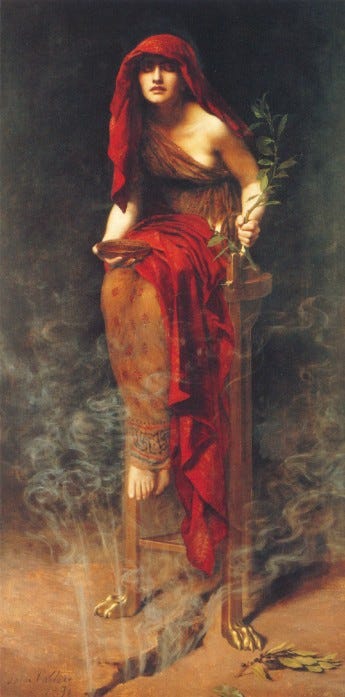Who Was the Most Powerful Woman in the Ancient World?
The Pythia and the Oracle of Delphi
Dear Classical Wisdom Kids,
The Greeks have influenced the modern world in many, many ways... and while there are plenty of times when we can relate to their lives (and its so much fun to do so), it would be a mistake to assume their day to day was exactly like ours.
Perhaps this is most apparent in their religion and their beliefs. For example, they enjoyed the various sacrifice from time to time…which, I’m hoping is not so common among our readership?
They also believed in oracles who could relay the judgment and guidance of the gods concerning future events… and they took them very seriously indeed. Especially the Oracle at Delphi with its priestess the Pythia, the most significant of all the oracles in the Greek world.
So today, please enjoy learning a bit about the Pythia, once the most powerful women in the entire ancient world… Who were they and how did they have such huge influence in history?
All the best,
Anya Leonard
Founder and Director
Classical Wisdom and Classical Wisdom Kids
P.S. Classical Wisdom Kids Club Members: We’ll have specific lessons from the Pythia coming out later this week! Watch this space… And if you aren’t a member, make sure to sign to enjoy our resources and help support this project:
The Pythia and the Oracle of Delphi
By Edward Whelan
In Greek mythology Apollo, the god of light, poetry and prophecy, established the oracle of Delphi. He set up the shrine after looking at other areas in Greece for a suitable shrine. He was actually a new-born and finding the location for his oracle was one of his first acts. However, Apollo found Delphi to be inhabited by a giant dragon, the Python, which the god killed.
Then the god of prophecy brought sailors by miraculous winds to Delphi and told them to spread the word about his shrine and its oracular powers. Delphi was believed by the Greeks to be the center of the world because it was where two eagles released by Zeus after circling the world met, and thereupon the Father of the Gods declared it to be the naval or omphalos of the world.

The History of Delphi
Because of the oracle, Delphi became the center of a major religious festival and drew believers from all over the Greek World and beyond. Individuals and political leaders headed to the Oracle to receive predictions and judgments that were believed and held in great esteem...including Socrates! Many city-states, leaders and royalty made important decisions based on the words of the oracle, such as war and peace.

The Pythia
The Pythia was a priestess at the sanctuary of Apollo and was selected from among the priestesses at the Temple of Delphi. Usually, the Pythia was from the elite and often well-educated, which was rare for women at the time. Over the centuries, the number of Pythia increased as Delphi became more popular. In some accounts, the Pythia was originally a young woman but after a man fell in love with her, this changed. In later centuries the Pythia was typically an older woman.

She would tell the prophecies of Apollo. Those who wanted the prophecy of the god would give an offering to the priestess and a goat. When she was interpreting the prophecy, she would go into a special room where Bay and other leaves would burn in a bowl. There at the center of the temple, known as the Omphalos, she sat on a special seat next to a deep chasm. The smoke from the burning leaves and the chasm would surround her and then she fell into a trance during which she gave the oracle from Apollo.

Delphi in Greek myth was the centre of the world. It played an important role in religious, political, and cultural life for centuries. Delphi was an internationally famous site and even non-Greeks would visit the oracle. Pythia was a priestess who would tell the judgment and knowledge of Apollo to those who sought his help and guidance. Delphi and the Pythia played a major role in Greek life for centuries.
Let Little Readers Read!
Keep reading with a 7-day free trial
Subscribe to Classical KIDS to keep reading this post and get 7 days of free access to the full post archives.



